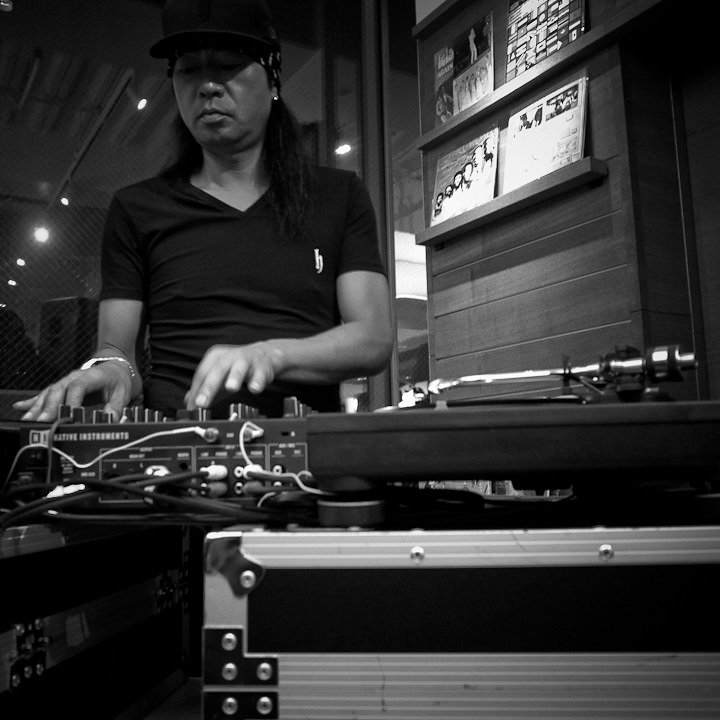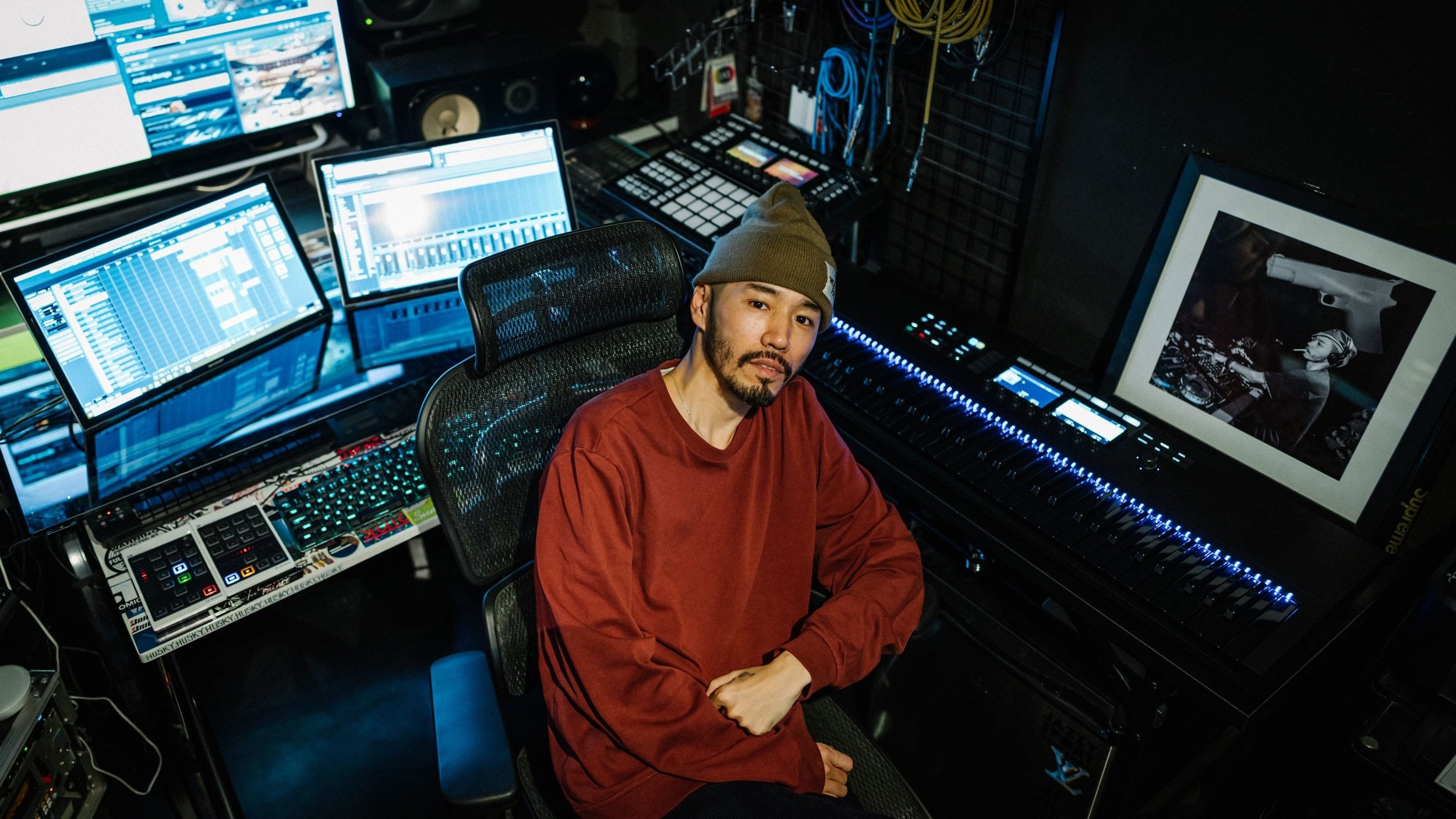808s & Drum Breaks: A Guide to Japanese Hip Hop Producers

Japan excels at music.
Thanks to centuries of music tradition, a thriving contemporary art culture, and a substantial domestic instrument production industry, Japan has time and time again adopted, adapted, and revolutionized nearly every genre introduced to its diverse music community. One genre which Japan has been making a name for itself in for decades now is hip hop.
While Japan’s MCs and rappers have long been rightfully praised on the global scale for their penchant for inventiveness and lyrical messaging, many of the country’s most prolific beatmakers have been overlooked.
Hip hop is, after all, just as much about beats as it is about lyrics. Japan’s hip hop producers have known this since the inception of the genre in the country, not only taking notes from the hip hop scenes of New York, Los Angeles, and [in recent years] Atlanta, but injecting elements of Japan’s rich music culture into the scene, fostering one of the most influential hip hop communities outside of the Western world.
Sabukaru would like to delve into these themes, and identify some of our favorite hip hop producers and beatmakers who have provided a substantial [and far too often overlooked] contribution to this scene’s development over the years.
Nujabes
Unlike many of Japan’s greatest producers, Nujabes is rightfully among of the most celebrated figures of all time in the alternative hip hop world, producing a legendary catalog of beats during his unfortunately short career.
First gaining notability with his renowned 2003 tape Metaphorical Music and later with 2005’s Modal Soul, Nujabes would quickly garner the respect of the global hip hop community.
Nujabes’ sound is easily recognizable for its cool, mellow atmosphere; taking heavy notes from free jazz and minimal electronic. The birth of lofi hip hop [or chillhop] is widely attributed to Nujabes for this uniquely blended style.
Nujabes tragically lost his life in a car accident on Tokyo’s Shuto Expressway in 2010, leaving behind his widely acclaimed [but sadly limited] discography, and his legacy as one of Japan’s most genius musical innovators.
DJ Krush
A giant in the 1990s Japanese hip hop scene, DJ Krush was considered a legend during a time when purely instrumental hip hop had little recognition. In fact, during this time it was often debated in the global hip hop community whether hip hip could even be called hip hop without lyrics.
Regardless, DJ Krush quickly proved his brilliance with his 1994 debut tapes Krush and Strictly Turntablized, going on to produce a number of other prolific tapes including Kakusei in 1998, and Zen in 2001.
Today, at the age of 60, DJ Krush remains active and creatively inspired with recent works such as Butterfly Effect receiving rave reviews from underground hip hop fans.
Despite the lack of lyrics in DJ Krush’s tapes, the tracks exude character and non verbal messaging with a dark grimy atmosphere and decidedly underground charm. Along with the likes of DJ Shadow, DJ Krush played a principle role in establishing instrumental hip hop worldwide, with Krush simultaneously drawing attention to the larger Japanese hip hop scene, all without rapping a single bar.
Major Force
Kan Takagi [left], Hiroshi Fujiwara [right]
In the early 1980s, Urahara paragon Hiroshi Fujiwara visited New York City and quickly fell in love with the recently burgeoning local hip hop genre. Fujiwara returned to Japan with a number of local hip hop records, and through DJing, introduced the entire country to the young genre.
With rapid increasing domestic interest in hip hop, Fujiwara linked with Kanto based DJ and producer Kan Takagi to form Tiny Panx in 1985. With a number of parallels in their creative interests [such as street fashion and punk music], the pair was a match made in heaven.
In 1989, their Takagi produced disco infused hip hop track Last Orgy became a smash hit and Fujiwara and Takagi became major figures in the growing scene, helping to shape it in its young years.
Tiny Panx then went on to form Major Force with multi genre musicians Toshio Nakanishi [Tycoon To$h], Masayuki Kudo [K.U.D.O.], and Gota Yashiki who had all previously worked together on a number of music projects.
The five [and a number of frequent collaborators] went on to release a highly successful EP and later formed the collective into a proper label.
With the crew’s musical interests and history spanning hip hop, jazz, punk, and electronic dance, their tracks’ instrumentals are notably diverse and blended with a wide variety of sonic flavors.
DJ Honda
Beginning his musical career at 17 playing in a local rock band by the name of The Clique, DJ Honda soon transitioned to DJing, playing in nightclubs in Shizuoka City. He quickly gained notability for his skill scratching and mixing, landing more elusive gigs at clubs, radio stations, and record labels in Tokyo.
Soon after he moved to the US, competing in DJ competitions in New York and Los Angeles. It was here DJ Honda blew up on the global scale, particularly in the West Coast scene, working with such legends as Eazy-E, Ice T, Xzibit.
In 1995 he dropped his debut eponymous project [DJ Honda], featuring Biz Markie, Common, Fat Joe, Gang Starr and Redman. Two years later he dropped his followup, h II, featuring the likes of De La Soul, Mos Def, KRS-One, and the Beatnuts.
DJ Honda was a household name worldwide at this point, going on an international tour in the late 1990s, and starting his own label, DJ Honda Recordings in the early 2000s.
Today DJ Honda remains active and relevant, as one of the biggest Japanese names in hip hop to break through on an international scope.
MURO
Muro, commonly referred to as the “king of digging” for his love of vinyl, played a major role in the Japanese hip hop scene during the 1990s, being closely related to DJ Krush as a part of his crew of producers, the “Krush Posse”.
A stark hip hop traditionalist, Muro called for purity in Japanese hip hop during this era, which is audible during his time performing as an MC in prolific group Microphone Pager, with skilled wordplay and lyrical complexity.
Following an accident at a show that rendered him temporarily deaf in his left ear, Muro took up DJing and production. Quickly his penchant for hearty drums and intelligent sampling in his production was noticed by the entire rap community, and he went on to work with a wide range of artists within the scene.
Muro’s love of a diverse range of genres and vinyl is palpable with layered instrumentation featuring soul and jazz samples, and a high degree of turntablism [or “scratching”].
Chaki Zulu
An avid fan of a number of genres, Chaki Zulu first began producing tracks in the electro house subgenre before attaining a residency DJing hip hop in Shibuya’s famed Dogenzaka clubbing district.
It was here Chaki Zulu began making inroads to the local rap scene. Since then, Chaki Zulu has found great success producing trap beats within the domestic scene, notably producing a number of tracks for Awich [a fellow member of the YENTOWN collective] and self proclaimed “trockstar” [trap rockstar] YDIZZY.
Zulu’s sound is contemporary and clean, with futuristic beats and club friendly bass that accompanies the unique vocals and high energy of his common collaborators.
Over Kill
Fuji Trill [left], Knux [right]
Two more highly respected producers in Japan’s current rap scene, Fuji Trill and Knux are notable for their metalcore inspired approach to the genre a la the likes of SoundCloud screamo rappers, a subgenre that has blown up over the past five years.
Loudly visceral and unapologetically aggressive, this duo [jointly operating under the name Over Kill] have been bringing this hardcore sound to Japan recently, leading the way for its success domestically.
Over Kill’s electric guitar samples, fast drums, and booming bass serve to perfectly complement their common hardcore collaborators, such the legendary Jinn Dogg.
DJ Kenn
DJ Kenn [left], Chief Keef [right]
Inspired by hip hop at a young age, DJ Kenn moved to Chicago in his early 20s where he soon met the then 16 year old Chief Keef while walking his dog on Chicago’s Southside. In large part thanks to Kenn’s collaborative efforts, Keef would become one of the most influential and iconic rappers of the early 2010s.
With DJ Kenn having just gotten into production, and Keef having just gotten into rapping, the two formed a close friendship and creative synergy, this led to collaborative hits such as “Bang”, the music video of which prominently features Kenn’s studio and even his aforementioned dog.
The two remained closely related for several years following, with Kenn producing several tracks for Keef, and even shooting a number of his music videos.
Today Kenn remains based in Chicago, and over the years has produced tracks for legends in both the US and Japan.
His style reflects his creative upbringing in Chicago alongside Chief Keef with heavy drill inspired drums and booming notes.
For four decades now, hip hop has remained a cultural force in Japan, continuing to draw an ever increasing interest from fans and creatives alike, and substantially altering the global hip hop scene with the country’s unique creative flavor.
Behind each bar of every rap driving this scene, there is a producer shaping the track with catchy drums and niche samples.
This role is far too often overlooked or undermined, not only in Japan, but around the world. Nevertheless, Japan’s hip hop producers continue to make waves in the global hip hop community one beat at a time.
About the author:
Kade Nations is the music brain of the Sabukaru team.













